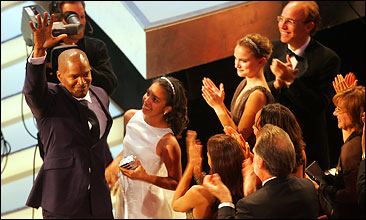Wednesday, March 02, 2005

March 2, 2005
Oscars Get Thumbs Up From Those in Charge
By LORNE MANLY
In a year when genuine excitement seemed to elude the Oscars, the inner councils of the Academy of Motion Picture Arts and Sciences are declaring victory for a streamlined, hopped-up show that suffered only a slight decline in the ratings and captured more young viewers, according to academy members and officials interviewed since the telecast.
But some members were sharply critical of Chris Rock's
"You're not selling Preparation H here," said John Calley, a member of the academy and a former chairman of Sony Pictures Entertainment.
Mr. Calley, who is widely regarded as one of the film industry's elder statesmen, added, "You don't sacrifice the essence of it to achieve speed or youth."
The executives and board of the academy will meet in the coming weeks to conduct their post-mortems, but top officers are encouraged by the size of the television audience. The final ratings from Nielsen Media Research tallied an average audience of 42.1 million people, down about 3 percent from the 43.5 million who tuned in last year. But other awards shows, like the Golden Globes, have recently suffered much steeper declines. And among viewers 18 to 34, the sweet spot for advertisers - who paid an estimated $1.6 million for a 30-second commercial this year - the ratings were the highest since 2002.
"In view of the fact of declining television audiences in all categories and awards shows in particular, I think that's a significant triumph," said Frank Pierson
The Oscars have lost some of their cachet to the proliferation of awards ceremonies and television shows and magazines that cover celebrities' every step (or misstep). By the time Jamie Foxx
The alterations made this year were aimed at helping the Oscar show maintain its dominance and not jeopardize the nearly $45 million a year the academy gets from ABC for the rights to telecast the event. Bill Mechanic, a producer and former chairman of 20th Century Fox Filmed Entertainment who is a member of the academy's board of governors, said he was satisfied with the changes over all.
"I thought it needed to move a bit forward, and I think it did," he said.
But the tweaks to the format - which involved bringing whole groups of nominees onto the stage and handing out some Oscars in the aisles of the cavernous Kodak Theater - have met with occasional disgruntlement. To some it even seemed cruel to award Oscars in the aisles. "To give it to them in an alleyway, or a men's room, or a driveway just diminishes the experience," said Mr. Calley, who said out loud what other members said privately.
Giving out the awards in the seats also created a new problem. The television audience almost never sees empty seats, as the organizers press scores of seat fillers into service to plop down when a celebrity takes a break from the proceedings. But there were conspicuous gaps in the first rows behind the orchestra seats, as guests clustered in the lobbies throughout the broadcast to share drinks and chatter on cellphones.
"The seat fillers seemed to do a better job in previous years," Mr. Mechanic said.
As for an alternate arrangement that had nominees on the stage while the winners were named, Mr. Pierson acknowledged room for improvement. "We missed individual attention to the nominees," he said.
All these alterations, however, did speed up an Oscar telecast that can sometimes crack the four-hour mark. The academy said Sunday night's show, which clocked in under 3 hours and 15 minutes, was the shortest since 1986.
Meanwhile, Mr. Rock, the new host who marketed himself and the show to an extent few academy members could remember, got mixed reviews both inside and outside the group. Tom Shales of The Washington Post, for example, wrote that "Rock's stint as an Oscar host was strangely lame and mean-spirited."
And it was not just Sean Penn
While some critics found the usually caustic Mr. Rock's patter strangely toothless, others worried that his jabs at President Bush could alienate some viewers. Mr. Pierson dismissed those concerns, calling Mr. Rock "terrific" and adding, "To hermetically seal out any relationship to the larger world in which we live is just plain stupid."
Van Toffler, president of MTV Networks Group and a veteran of MTV's "Video Music Awards," which has ridden unpredictability to become the highest-rated entertainment special on cable, said, "I applaud them for mixing it up." But, he added, "Some of the changes worked, some didn't."
Asked how the ur-awards show could be jazzed up, Mr. Toffler suggested more unexpected couplings for presenters, giving the film clips more energy and moving some of the less-anticipated awards to the preview show. But academy realities might make deeper change difficult.
The existence of the various branches, like cinematography, makes banishing categories considered essential building blocks of the movie business an unlikely occurrence. "There's such a longstanding tradition with the Oscars that it doesn't allow for spontaneity and irreverence," Mr. Toffler said.
The academy's efforts so far appear to have found an appreciative audience with another important audience: the sponsors.
"We're pleased with the performance of the show," said Ryndee Carney of General Motors, which ran commercials for the corporation and its Cadillac division.
The ratings may be lower, but in the odd calculus of television, in which the proliferation of cable channels has splintered the audience into ever-smaller units, all-encompassing events like the Academy Awards have become even more valuable. Ten years ago, when more than 48 million people saw "Forrest Gump"
The Oscar show, like the Super Bowl, is one place advertisers can go to reach a mass audience that will actually watch the commercials. "We know people don't record these shows," Ms. Carney said. "They want to watch them live."
